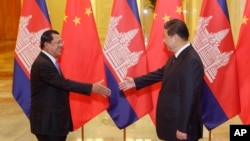Chinese companies last week pledged some $7 billion in new investment in Cambodia following a meeting with Chinese leaders and Prime Minister Hun Sen in Beijing.
Hun Sen was visiting China alongside more than 100 world leaders for high-level political talks.
Executives of the Greenland Holding Group and Henan Transport Investment Group reportedly told Hun Sen the new projects would include an expressway from the capital, Phnom Penh, to the coastal port city of Sihanoukville. Also on the table is the construction of another satellite city near Phnom Penh, the construction of a tourism center, and the launch of a new commercial bank.
A statement released by the government said Hun Sen welcomed the decision, which would be followed by a series of formal agreements to pave the way for the investments when China’s prime minister, Li Keqiung, visits Cambodia in January.
It added that Hun Sen expected the investment would create an additional 20,000 jobs for Cambodians.
China has backed a crackdown on Hun Sen’s political opponents, independent media outlets and civil society in recent weeks that has seen the country’s main opposition party banned amid a growing paranoia that foreign interests have plotted to overthrow him.
Cambodia relies heavily on China as a source of aid and loans, as well as private investment. In 2016, Chinese firms spent about a third of all capital invested in Cambodia.
Political analyst Lao Monghay called the investment pledge “good news” but warned that the Kingdom would need to ensure it did not rely too heavily on China.
“What I’m worried about is that, if we rely on one superpower when it comes to our source of investment, the country would likely come under [a form of] colonialism in the future,” he said.
Seang Thay, commerce ministry spokesman, said Cambodia did not discriminate when it came to sources of funding for development.
“We cannot say which country should come or with how much investment. We welcome everyone and we have no discrimination when it comes to trade, the economy, and investment,” he said.








